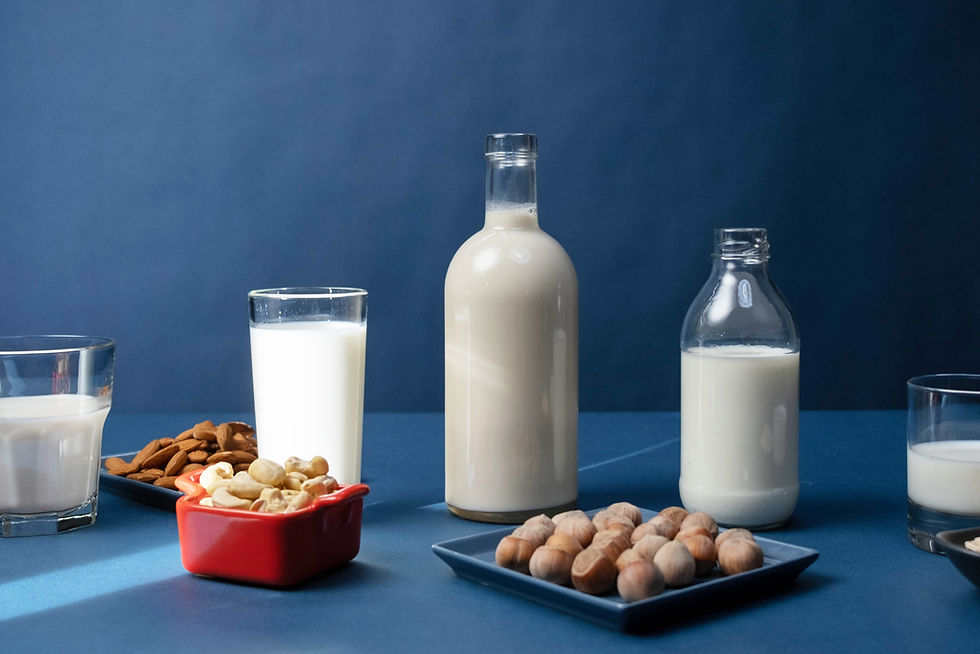Vegan Sweets - Vegan Kit Kat
- The Young Vegan

- Oct 3, 2021
- 3 min read
"You asked, we listened! Say hello to the new KitKat® V – our first ever plant-based break!"
There aren't many people that don't like Kit Kats, in fact they are the third best selling chocolate bar in the UK. A Kit Kat is a chocolate-covered wafer bar made by Nestlé, except in the United States, where it is made under license by the H. B. Reese Candy Company. The bar comes in the from of fingers, joined together by chocolate which can be snapped to eat individually or you can just bite a chunk off. The chocolate bar is mostly sold as a four finger bar but two finger bars are also available. The four finger bar being sold in a plastic wrapper, and the two finger bar being sold in the more traditional foil and and paper wrapper. Once the wrapper is removed the two fingers can be separated by running a nail down the grove between the fingers and snapping them apart with the foil wrapping still covering them. Perfect for sharing and not getting your fingers sticky, the paper and foil can also be recycled, while the plastic cannot.

A Brief History of the Kit Kat
The Kit Kat was created by Rowntree's of York, United Kingdom, the same company that made Fruit Pastilles. Rowntree's was bought by Nestlé in 1988, who continue to make Kit Kats today.
The bars are made of three layers of wafer, separated and covered by an outer layer of chocolate.
The original four-finger version of the bar was developed after a worker put a the idea of "a chocolate bar that a man could take to work in his pack up" was put in the recommendation box at Rowntree's York factory. The bar was originally called Rowntree's Chocolate Crisp and launched in September 1935 in the UK, the two-finger version came later in 1936. It was renamed Kit Kat Chocolate Crisp in 1937 which became Kit Kat after World War II. Since 1957, the slogan for the Kit Kat in the UK has been "Have a break... have a Kit Kat".
The original recipe for the Kit Kat used milk chocolate, however, during World War II the recipe had to change due to food shortages. During this time the flavour was changed to dark chocolate and the packaging was coloured blue. After the war the name was shortened to Kit Kat, with the original milk chocolate recipe and red packaging.
Nestle Ethics
Nestle has never been known as an ethical brand or as a company that has good values. They have faced many battles, including coming up against Greenpeace for using palm oil in their foods, facing a boycott after continuing to bottle water during a draught and the use of child labour in cacao plantations. Nestle is also known as a producer of foods that are not good for health and it seems that they are now admitting this amongst themselves, but not so much publically.
An internal presentation, made in early 2021, Nestle admitted that 60% of their foods are unhealthy, not only that, but 50% of their foods cannot be made healthy regardless of how the recipes are changed. These foods included items from pet food to baby food.
Nestle have attempted to improve the company's ethic with the launch of The Nestlé Cocoa Plan in 2009. This plan aims to "improve the lives of farmers in our cocoa supply chain" by addressing farming issues, such as agricultural practices and tackling deforestation, working to empower women and eliminate child labour. By becoming Rainforest Alliance certified and building long-term relationships with suppliers Nestle now only use cocoa that is certified as 100% sustainably sourced by Rainforest Alliance in the UK and Ireland.
Vegan Kit Kat
In 2021 Nestle have gone another step in improving their principles by producing vegan treats. The first notable change was Fruit Pastilles being made vegan, then a short while later the vegan Kit Kat was announced.
"One of the most common requests we see on social media is for a vegan KitKat, so we're delighted to be able to make that wish come true."
Alexander von Maillot, Head of Confectionery at Nestlé
The new Kit Kat, Kit Kat V, which will be sold alongside the regular, dairy based Kit Kat, adds to the growing list of plant based products, which includes alternatives to dairy made from rice, oats, soy, coconuts, peas and almonds such as non-dairy ice cream, coffee creamers, rice- and oat-based drinks, pea-based beverages, plant-based cappuccinos and lattes.
Having tried the vegan Kit Kat I can say that it's alright. It doesn't taste exactly the same as a the dairy-based Kit Kat, but it is nice and still satisfies that sweet tooth that so many of us have. It's also good to see a vegan product that isn't twice the price of the non-vegan version. Verdict - get some




شيخ روحاني
رقم شيخ روحاني
الشيخ الروحاني
الشيخ الروحاني
شيخ روحاني سعودي
رقم شيخ روحاني
شيخ روحاني مضمون
Berlinintim
Berlin Intim
جلب الحبيب